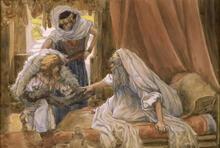Lucie Domeier
Lucie Domeier was born in Breslau but moved to Berlin and later England as a young woman and began to participate in a lively social scene. She also started to write around this time, although her earliest novel and correspondence with fellow author Henriette Herz has been lost. Her surviving work, including travel letters, essays, and poems, often addresses the challenges faced by women authors and the portrayal of women in literature. Domeier’s best known writing, a 1814 critique in German of Germaine de Staël’s De l’Allemagne, includes such themes.
Article
As a young woman Lucie Domeier (born Esther Gad) probably led a traditional Jewish life. Born in Breslau circa 1767, she married a merchant, Bernard, and bore four children—a son, Jonas, in c. 1791, and a daughter, Jeanette, in 1795, as well as two daughters, Rebecca (b. 1792) and Krössel (b. c. 1794), who died in in childhood. However, we soon find signs of her in the world of educated women, writers and philosophers.
In 1796 in Töplitz she met Rahel Levin (later Varnhagen), with whom she corresponded until 1826. In 1797 she became acquainted with Jean Paul, with whom she carried on a lengthy one-sided correspondence (published only in 1990). “Whoever loves an author, loves unrequited,” she wrote to him. In 1800 she moved to Berlin, where she wrote a novel, Die Geschwister (The Siblings), which has been lost, and engaged in a lively social life. She received guests in her home, moved in the “Wednesday Society,” and met frequently with Henriette Herz, with whom she began a (now lost) correspondence. In 1801, after several unsuccessful attempts to publish her works, she moved first to Prussia and then to England, where she married a physician, Wilhelm Domeier, by whom she bore a son, August, in 1804. Within a short time, she published several books: two collections of travel letters about England and Portugal as well as a collection of stories, essays, and poems, in which she frequently reflects on the difficulties encountered by women authors. In 1814 her most important work appeared: a critique in German of Germaine de Staël’s De l’Allemagne, of which an English version had appeared anonymously a year earlier. In her foreword she writes ironically: “In this little work I’ve succeeded in revealing my name and my sex. I fear that the reader’s judgment is more impartial and hence less prejudiced, when both are unknown. I was honored by this work’s being considered that of a man.” Lucie Domeier excerpted passages of De Staël’s work and, writing from the perspective of a “German woman,” juxtaposed them with detailed critical objections. In 1821 she once more traveled to Germany, where she again met with Rahel Varnhagen. She died in London sometime after October 1833.
Selected Works
“Einige Aeußerungen über Hrn. Kampe’ns Behauptungen, die weibliche Gelehrsamkeit betreffend.” In Der Kosmopolit 1798; Briefe während meines Aufenthalts in England und Portugal an einen Freund. Hamburg: 1802.
“Neue Reise durch England und Portugal.” In Briefen an einen Freund, II. Hamburg: 1803; Gesammelte Blätter. Leipzig: 1805.
Kritische Auseinandersetzung mehrerer Stellen in dem Buche der Frau von Staël über Deutschland. Mit einer Zueignungsschrift an den Herrn Jean Paul Richter. Aus dem Englischen übersetzt von der Verfasserin des Originals. Hannover: 1814.
Leucadio Doblado: Briefe aus Spanien. Aus dem Englischen übersetzt von E. L. Domeier, geb. Gad. Mit einem Briefe an den Dr. Tieck. Hamburg: 1824.
Hahn, Barbara, (ed.) “Geliebtester Schriftsteller. Esther Gads Briefwechsel mit Jean Paul.” In Jahrbuch der Jean-Paul-Gesellschaft 25 (1990): 7–42.
Bilski, Emily D., Emily Braun, and Leon Botsein. Jewish Women and Their Salons: the Power of Conversation. New York: Jewish Museum under the auspices of the Jewish Theological Seminary of America, 2005.
Hahn, Barbara. Unter falschem Namen. Von der schwierigen Autorschaft der Frauen. Frankfurt a. M.: 1991.
Rudert, Karin. “Die Wiederentdeckung einer ‘Deutschen Wollstonecraft’: Esther Gad Bernard Domeier für Gleichberechtigung der Frauen und Juden.” Quaderni 10 (1988): 213–261.
Lexikon Jüdische Frauen. Edited by Jutta Dick and Marina Sassenberg.












